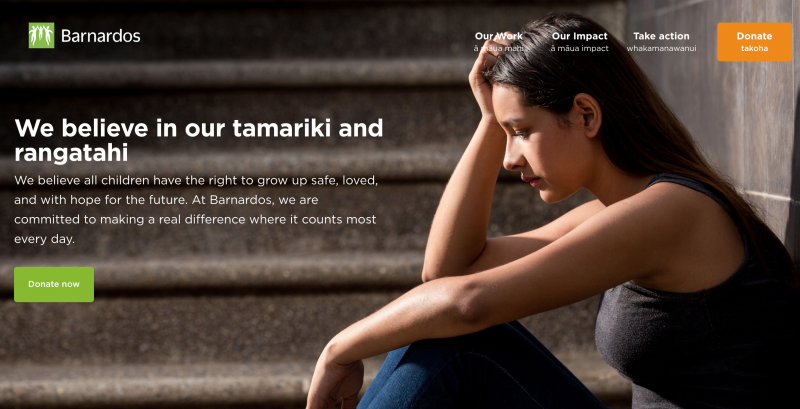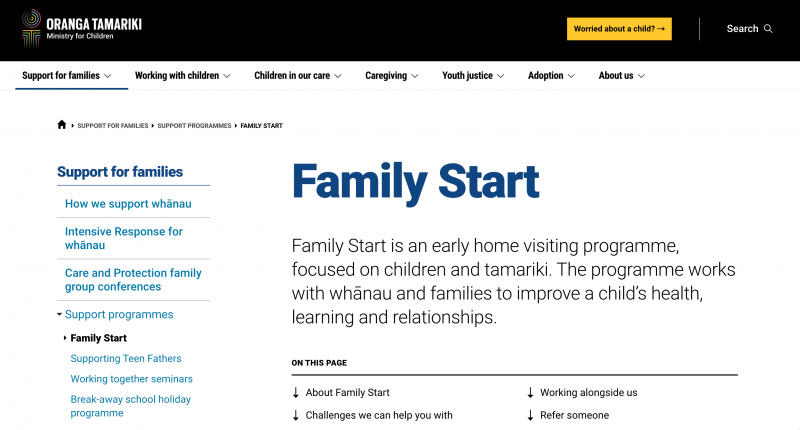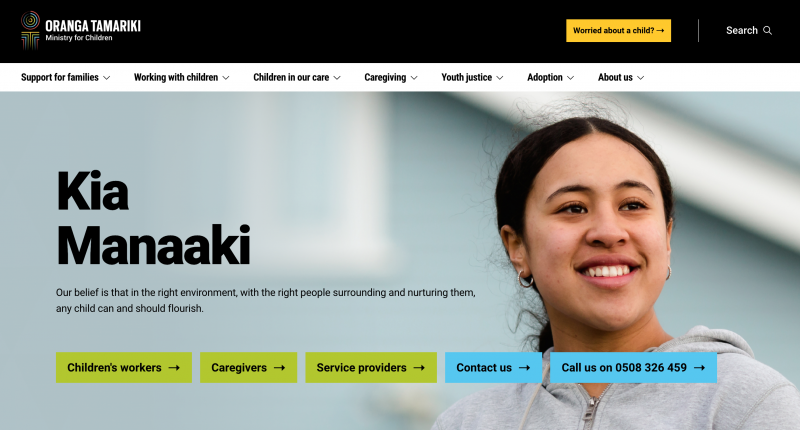The period of 'PURPLE crying' refers to a time period when some babies begin crying more and may be hard to settle. This usually starts at about 2 weeks of age and peaks at 8 weeks. It usually ends by 12 weeks of age. The good news is that the period of PURPLE crying will end!
Never Ever Shake A Baby
Never Ever Shake A Baby
It is normal for babies to cry, and it's normal for caregivers to get frustrated. Have a plan for what you will do if your pēpi keeps crying and you become upset or frustrated. It is never ever OK to shake a baby. Make sure that all the people who care for your pēpi know this. Never leave your pēpi alone with anyone that you think might lose control.
Key points about how to cope with a crying baby and the dangers of shaking a baby
Crying is how babies communicate - it does not mean your baby is being naughty.
- crying is how babies communicate - it does not mean your baby is being naughty
- have a plan for what you will do if your pēpi keeps crying and you become upset or frustrated - there are things you can do and people who can help you
- it is never ever OK to shake a baby - make sure that all the people who care for your pēpi know this
- never leave your baby alone with anyone that you think might lose control
What is shaken baby syndrome?
It may only take 1 or 2 hard shakes to seriously injure a small child.
Shaken baby syndrome is a combination of serious injuries that can occur when someone violently shakes an infant or young toddler.
It is the single most preventable cause of serious head injury in babies under 1 year of age in Aotearoa.
It may only take 1 or 2 hard shakes to seriously injure a small child. This is because babies and toddlers have relatively big, heavy heads and weak neck muscles. When they are shaken, the brain slams back and forth inside the skull, resulting in bleeding around the brain and damage to the brain itself. Some babies may even stop breathing, which can cause further brain damage.
The shaking can also cause bleeding into the back of the eyes. Many babies who are shaken also have broken ribs because they are held forcibly around the chest and squeezed when they are shaken. They may also suffer other broken bones during the shaking.
How can shaken baby syndrome happen?
Shaken baby syndrome usually happens when a parent or other caregiver shakes a baby or toddler very hard because they are very frustrated with them. The number one reason given for shaking a baby is "I just wanted the baby to stop crying". Forceful shaking may stop the baby crying, because it causes a head injury.
What are the consequences of shaking a baby?
Every baby is different, so the symptoms may vary. Symptoms may include poor feeding, vomiting, irritability, fits (seizures), drowsiness, breathing problems and even coma or stopping breathing completely.
There are serious long-term consequences for babies that are severely shaken. Some of these consequences may be avoided if help is sought immediately. There may be:
- permanent brain damage
- paralysis (caused by damage to the spinal cord)
- blindness
- deafness
- fits (seizures)
- broken bones
- delays of normal development
- death
Overall, in babies diagnosed with shaken baby syndrome, approximately 20% will die and 30% to 60% will suffer moderate to severe injuries.
How can you prevent shaken baby syndrome?
It helps to have a plan of what you will do if your baby keeps crying and you become upset or frustrated.
Shaken baby syndrome happens when parents or caregivers get frustrated with their baby or toddler, usually in response to crying.
Always remember:
- it is normal for babies to cry and it is normal for caregivers to get frustrated
- it's OK to walk away - put your baby in a safe place, close the door and take a break
- do not pick up your baby until you have calmed down
- never, ever shake a baby!
- never leave your pēpi alone with someone who may lose control
- share this message with everyone who is caring for your baby
- if you think your baby may be injured, seek medical help immediately
It helps to have a plan of what you will do if your baby keeps crying and you become upset or frustrated.
What if your baby keeps crying?
Some tips to help you cope with a crying baby
- try feeding your baby; if they don't seem interested, they are not hungry
- change your baby's nappies if they are wet or dirty
- make sure your baby is not too hot or too cold
- try cuddling your baby - they may be lonely or need comforting
- make sure there are no tight clothes on your baby that are hurting them somewhere
- if your baby is showing tired signs, put them down somewhere safe to sleep - tired signs include yawning, rubbing the eyes, fist-sucking, as well as grumpiness
If you are worried that your baby is crying because they are unwell, see your doctor or after-hours medical centre.
Everything above seems fine but your baby is still crying
You could try:
- wrapping and holding your baby safely in a light-weight blanket - many babies love to feel snug
- singing or talking quietly to your baby, or playing some gentle music - babies like soothing noises
- taking your baby for a walk in a front pack or stroller; you could also put your baby in their car seat and take them for a drive - motion generally helps to calm a baby down, and it's good for you too!
- calling a friend or family member - maybe they could come over and give you a break
You've tried everything and your baby is still crying
- put your baby in a safe place (such as their bassinet or cot) and leave the room for a while
- take a break - you have done everything that you can and have met all of your baby's needs
- check on your baby every 10 to 15 minutes
- never shake a baby
Check out more information and tips for when your baby is crying.
See some more ideas on KidsHealth about crying and what you can do
What should you do if you think your baby has been shaken?
Take your baby to your nearest doctor straightaway.
Dial 111 within New Zealand for urgent medical help if your baby is unconscious or having breathing trouble. Use the appropriate emergency number in other countries.
Don't let guilt or fear get in the way of your child's health. If your baby has a serious head injury because they have been shaken, it will only get worse without treatment. Early medical attention may save your baby's life and prevent serious long-term problems.
If your baby seems quite well but is fussy and/or vomiting, it is important that you tell the doctor that you know or suspect your baby has been shaken, so that they can give the proper treatment.
What can you do if you think you might hurt your baby?
Put your baby in a safe place and leave the room. Give yourself a break and seek help.
Where can you go to for help if you feel stressed?
People who might be helpful
- a friend or family member
- your family doctor
- your midwife
- your local Plunket nurse or family centre or other Well Child provider
Telephone helplines
Lifeline helpline
Lifeline helpline is a national helping for mental and emotional support.
Call 24 hours a day, 7 days a week on 0800 543 354. Free and confidential.
SHINE helpline
SHINE helpline is a national family violence helpline.
Call 24 hours a day, 7 days a week on 0508 744 633. Free and confidential.
Samaritans
Samaritans operate a crisis helpline for confidential, non‑judgemental & non‑religious support.
Call 24 hours a day, 7 days a week on 0800 72 66 66.
Youthline
Youthline offers a free helpline service (text, phone, webchat or email) for young people.
Call 24 hours a day, 7 days a week on 0800 376 633 or free text 234.
Healthline
Healthline provides free advice to parents and whānau if you are worried about your child's health.
Call 24 hours a day, 7 days a week on 0800 611 116.
PlunketLine
PlunketLine is a free parent helpline and advice service available to all families, whānau and caregivers.
Call 24 hours a day, 7 days a week on 0800 933 922.
Organisations that might be helpful
Barnardos
Barnardos offer a broad range of services for children, families and whānau throughout Aotearoa. Take a look at their website to see what services are available in your area.
Family Start
Family Start is an early home visiting programme focused on children and tamariki. The programme works with whānau and families to improve a child’s health, learning and relationships. Take a look at this website for more information.
Oranga Tamariki
Oranga Tamariki, Ministry for Children (previously Child, Youth and Family) is a government department in New Zealand responsible for the well-being of children, specifically children at risk of harm and youth offenders. Check out their website to learn more about how they can help.
This page last reviewed 11 May 2023.
Do you have any feedback for KidsHealth?
If you have any feedback about the KidsHealth website, or have a suggestion for new content, please get in touch with us.
Email us now


